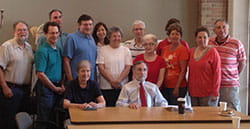As I reread Nephi's first sentence a third time, I noticed that the order of its clauses was similarly significant, that they presaged the events of 1 Nephi and did so in order. Chapter 1, for instance, describes the situation of Nephi's "goodly parents," especially his father's prayer and prophetic call. Chapter 2 relates several experiences Nephi had with Lehi where he was taught "somewhat in all the learning of [his] father." Chapters 3 through 7 detail Nephi's efforts to procure the brass plates and the way he consequently suffers "many afflictions in the course of [his] days." And the pattern continues, as chapters 11 through 14 lay out the "great knowledge of the goodness and the mysteries of God" Nephi receives from a marvelous vision, and chapter 19 shows Nephi being commanded to "make a record of [his] proceedings in [his] days." Right from the start, Nephi seems to be putting his journey in divine perspective, as something positive or productive, and in so doing encourages me to do the same with mine.
Lesson Four: Ask lots of questions
Torah class taught me to ask lots of questions about the scriptures and encouraged me to discuss my answers with others. Questions seem to come easily to the members of my Torah class — not just questions about a verse's translation or its connection to other scriptural passages but about its historical accuracy, impact on rabbinic tradition, significance in Jewish history, effect on synagogue politics as well as commentary on recent governmental policies, scientific trends, familial experiences, and current events. These questions are not veiled attacks, attempts at putting down or making fun of or destroying faith. They are actually as acts of faith, earnest affirmations that there really are answers and that sustained and vigorous and open discussion will eventually reveal them.
Rereading 1 Nephi 1 yet again, this time with my Torah classmates in mind, I saw a number of questions they would enjoy discussing. Why "goodly" instead of "good"? Why was Nephi taught only "somewhat" in the learning of his father? Why "course of my days" instead of just "days"? I could easily see my Jewish friends coming up with all sorts of answers to these questions. But would the same approach work with Mormons? I did not know. As an experiment, I asked a group of Mormons why they thought the Book of Mormon began with "I."
It was a simple question on the smallest amount of text I could find, and yet it generated a wonderful discussion and an amazing array of answers. Several agreed with me that it connected us to Nephi in a very personal way and instantly inserted us into his story. Others said that it set his book up as a legal document, and they then discussed the possibility that Nephi was here swearing to the accuracy of his story and presenting it as a kind of last will or testament. One man focused on the shape of the letter "I" and explained that since the Book of Mormon seeks to connect heaven and earth, it was only appropriate that the book begin with a letter shaped like a conduit between the two. Two women brainstormed on the sound of the book's first letter and found profound meaning in the role of seeing with our "eyes" in 1 Nephi as well as its propensity to make positive, affirming statements, "ayes," as it were. The possibilities seemed endless, even for Mormons.
An Ultimate Lesson: Leave questions unanswered and return to them again and again
This is perhaps the ultimate lesson I learned from my Torah class: that scripture study never really ends. It may be suspended temporarily, but the journey goes on. Precisely at 10:30am, Rabbi Friedman closes his book, wishes everyone a Good Sabbath, and rushes off to officiate at someone's bar or bat mitzvah. He does not summarize the session or in any way attempt to wrap up what has been said. He simply leaves, as do the rest of us, secure in the knowledge that next month we will pick up where we left off, reading more verses, asking more questions, discussing more answers, and finding more meaning in the Torah. With it, as well as with the Book of Mormon, there is always more to learn and to discuss.
Bob and I continued to talk as we walked back to our cars. He asked me again about my book, and I explained again that I was attempting to apply the lessons I had learned from this class as well as my readings in Judaism to the Book of Mormon. Again, he said that what I was doing sounded interesting and encouraged me in my work. As we reached our cars and were about to go our separate ways, he asked me if he, as a Jew, could understand the Book of Mormon if he read it.
"I think so," I responded. "In any case, I would be grateful if you would give it a try and tell me what you think of it. Not many Jews have read the Book of Mormon."
He smiled his crooked smile again. "Well, you have, and you are almost a Jew."
 Almost a Jew? Considering what I had learned in Torah class, I considered that a supreme compliment. And I told him so.
Almost a Jew? Considering what I had learned in Torah class, I considered that a supreme compliment. And I told him so.




